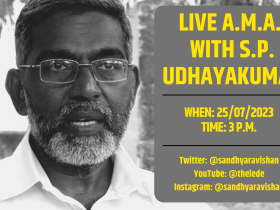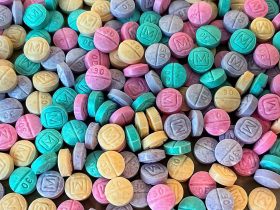On 25 September 2018, three men were busy shopping in Kothari market in Indore, Madhya Pradesh. Two were Indian nationals and the third a Mexican national. One Indian and the Mexican had had breakfast at the Hotel Marriott before the shopping trip.
The trio visited five different shops until they reached a VIP suitcase showroom.
There, the Mexican found exactly what he was looking for.
“Three people had come. I do not remember very well, since it was so long ago. I remember there were two people and the third person seemed to be their driver. But I am not sure if he was their driver. There was one Indian and one foreigner. They wanted six hard-shell suitcases like those (points to one). That is not the exact model, because our suitcase models change every six-seven months, but it was similar to that. They wanted all the six suitcases in black colour. Since we are a retail store, we do not store so many pieces here. I arranged them from our godown. We delivered it the same day to the address they mentioned,” Bhawani Shankar, Store Associate at the VIP showroom in Kothari Market told The Lede.
The hard shell blue suitcase in the centre is similar to the one picked by the MexicanPhoto credit: Sandhya Ravishankar
From there the Mexican was dropped off at the hotel. In the evening, two Indians arrived to pick the Mexican up. They went to the office of a firm called Science Intermediary in South Tukoganj.
A few hours later, all of them were picked up by the Directorate of Revenue Intelligence (DRI), arrested and subsequently jailed.
These men had been caught in the act of packing fentanyl meant to be smuggled into Mexico.
Fentanyl is a synthetic opioid and is one of the most dangerous synthetic drugs currently on the market. Fentanyl is 50 times more potent than morphine.
According to the Center for Disease Control and Prevention (CDC), of the 72,000 Americans who died of drug overdoses in 2017, nearly 28,500 involved fentanyl or a similar type of synthetic drug – 45% higher than in 2016.
When legally used, fentanyl is effective as pain medication and is used with other medicines as an anaesthetic.
The Chemist
Silence and unease still surround those who had anything to do with the men arrested in the fentanyl drug bust case.
Authorities are reluctant to speak, dubbing it a “sensitive” case. Families of those arrested are fearful, upset and still in shock. Neighbours and landlords of the buildings used by these men are paranoid.
Over 10 months, The Lede pieced together what actually happened and why this drug bust is so “sensitive”. Extensive field investigations spanning Indore, Delhi and China were conducted by The Lede and partners in The Cartel Project. The investigation yielded information about the power and reach of the Mexican drug cartels, in particular the violent Sinaloan cartel, as well as unearthing a thriving supply chain of the drug and its input chemicals in China.
But first, the India story.
Around March 2018, a well-respected chemist Mohammed Sadique was approached by Manu Gupta, a businessman in Indore. The two knew each other although they were not close friends. Sadique was 60 years old and in poor health. He suffered from retinitis pigmentosa, which left him partially blind and without peripheral vision.
“He had a minor heart attack, kidney problems, some issue with his spinal cord (slipped disc), fracture in the leg and the bone is not fixed properly, he has a metal rod in his hand and prostate issues,” Sadique’s elder daughter told The Lede. Sadique’s daughters, wife and sister spoke to The Lede on condition that they would not be named.
By all accounts, Sadique was a brilliant chemist whose keenness on research was well known.
“He has a PhD in Chemistry,” explained his elder daughter. “He has always been inclined towards research all his life. He keeps doing experiments. In fact, a lot of our daily cleaning solutions in the house were made by him. He made a hair removal solution once by himself in his manufacturing unit many years ago. That unit was called Dr Sadique’s Laboratory. He used to sell chemicals that he had himself made. That is what he was doing with his firm Science Intermediary – he was running a chemical and glassware business and he would export to the US and Mexico. He has exported many life-saving drugs too.”
This brilliant mind was to be put to use for more nefarious activities, according to authorities that The Lede spoke with.
“Manu Gupta was the link between the Mexican cartel and Mohammed Sadique,” said a source close to the case. “It is Manu Gupta who roped Sadique in and asked him to set up a lab to manufacture fentanyl illicitly.”
Sadique rented a small 300 square feet room on the second floor of a unit inside the Pologround Industrial area for a monthly fee of Rs 8000. There, he set up his makeshift lab with the help of two assistants – Ramchandran and Majid Khan.
“I hardly ever saw Sadique or anyone he worked with,” said a neighbouring factory unit owner, on condition of anonymity. “I did not think that anything could be wrong. I did not ask him what research he was doing or what he was preparing. It is not my business. I generally leave my workplace by 5.30-6 pm. Sadique used to come after that and work in the night. My employees don’t know him either. There were two people who used to come and go (to Sadique’s lab) – I have heard the name Ramchandran but I do not know the other person’s name. I have not spoken to them either.”
In June this year, an anonymous hacker group called Distributed Denial of Secrets made public 269 GB of files from the US federal and state law enforcement agencies. Termed the Blue Leaks, this unprecedented publication of confidential and sensitive information was akin to WikiLeaks.
The Cartel Project partners scoured through the information to find a startling report by the US Drug Enforcement Administration (DEA) on the Indore drug bust case.
“DRI reported that Sadiq manufactured illicit fentanyl in a facility using standard laboratory glassware and wearing only rudimentary personal protective equipment. The laboratory assistants stated that they felt “giddy” while they were manufacturing the so-called “pesticide.” The synthesis route consisted of four stages not involving such standard precursor chemicals as NPP and 4-ANPP. Instead, Sadiq manufactured the precursor chemicals needed for the total synthesis of fentanyl. The use of a total synthesis method eliminates the ability of law enforcement officials to monitor the movement of common precursor chemicals and locate illicit fentanyl laboratories,” states the report.
In effect, Sadique had used his keen knowledge not just to manufacture fentanyl, but to manufacture even the chemicals that went into making fentanyl (precursors).
The Lede managed to get a sneak peek into the room that had once served as Sadique’s lab. The room itself has been locked and sealed by the DRI.
A glance into an open window shows bottles and drums of chemicals. There is also a large piece of equipment against one wall of the room, which appears to be some sort of filtration machine.
A strong smell of chemicals wafts from the open window, even two years after the room was sealed.
It was in this room that the DRI says it found packets of white and black coloured powder, weighing a quarter kilogram each. The fentanyl hydrochloride was mixed with black carbon powder in order to escape detection during shipping.
The DRI also seized one drum containing acetonile, two drums of methyl chloride and a fourth drum containing THF (tetrahydrofuran) from the premises.
The Lede has found that the DRI did not handle any of the chemicals. A special team of the DRDO (Defence Research and Development Organisation) was brought in before the arrest to handle and take the fentanyl to Hyderabad where it was tested.
Another DRI team simultaneously searched Sadique’s residence in Khajrana, Indore.
“The DRI came to our house at around 11 pm that night,” Sadique’s wife told The Lede. “They took his diary after searching the house. We were very shocked at his arrest.”
The family denies that Sadique was involved in the illicit manufacturing of fentanyl.
“The drug which he is accused of making is not what he was actually manufacturing,” said Sadique’s elder daughter. “He told us that he was making a new medicine for respiratory ailments – basically improving upon an existing medicine which had many side effects – and he was trying to make a new one without side effects. Unfortunately, he got caught in this confusion or a plot, we don’t know which. He has been accused of doing something that he did not do,” she said.
“He was psychologically trapped into writing it,” said Sadique’s sister when asked about the statement made by Sadique to the DRI. “My brother told us that the investigators told him to write what they say, otherwise they will involve his wife and daughter in the case. He said he had no choice but to write the statement. The DRI also tricked us – they told us that it will look bad for Bhaijaan (elder brother) if we hire a lawyer and so we did not hire a lawyer for six months.” DRI officials could not be reached for a response on this allegation.
Sadique’s bail applications before the Indore Sessions Court as well as the Indore High Court were rejected. He is currently lodged at the Bhopal jail since it has access to medical facilities in AIIMS, Bhopal.
By all accounts, jail has taken a toll on Sadique. “My husband has lost a lot of weight in jail. From 70 kg he has come down to 44 kg. He is very unwell. He is 62 years old and his waist size is just 28 inches now,” rued his wife.
The Facilitator
Manu Gupta was 44 years old when he was arrested.
A successful businessman, he would, in the words of his wife, “export and import anything. He was always trying to find out something he could export. Once he imported toys. Not just chemicals, he exports anything that is in demand,” she said, speaking to The Lede outside their residence near Bombay Hospital in Indore.
She requested that she not be named.
Gupta had, in the decade before his arrest, exported chemicals to China and Mexico and imported chemicals from China, among other items.
Documents available with the Registrar of Companies show his company Mondiale Mercantile Pvt Ltd, registered in 2012, as being equally owned by him and his wife. In 2015, the company recorded turnover of Rs 45 lakh. In 2016, it had a turnover of Rs 8.85 lakh and in 2017, Rs 7.3 lakh.
According to the DRI, Gupta was the key link between the Sinaloan cartel, the Chinese suppliers and Mohammed Sadique.
It was also around March 2018 that Manu Gupta, who had roped in Sadique to manufacture fentanyl, began to send fentanyl mixed with carbon powder to Mexico via Speed Post. The recipient was one Jorge Renan Solis-Fernandez, a Mexican national. According to the DRI, Gupta received between $60,000 – 80,000 as remuneration, into an account in Hong Kong’s Hang Seng bank. The profit in this, for both Gupta and Sadique, was $7500 per kilogram of fentanyl.
On 07 August 2018, the Mexican office of the DEA seized 2.4 kg of fentanyl. The package, sent by Manu Gupta, contained bottles of black powder. Analysis of the powder revealed that it comprised 50% fentanyl and 50% carbon.
“The carbon was most likely added to deter identification of the fentanyl. The total “pure” fentanyl weight was 1.19 kilograms. This was the first known seizure of fentanyl from India,” states the DEA report.
By 13 August 2018, the DRI had confirmed that Gupta had previously sent six kilograms of fentanyl to Mexico through multiple air shipments.
Between 04 and 08 September 2018, Gupta sent his assistant Maan Singh Dandotiya to send yet another parcel containing fentanyl to Mexico via Speed Post from the Pologround Industrial Estate post office.
But this parcel was returned to Gupta, as he had not provided sufficient details about the sender.
“I was not present on the day when the parcel was given here to the post office for sending to Mexico,” Harish Sanware, postman told The Lede.
“I was on leave that day and my colleague Ram Dulare Prajapati received the parcel. I came to work the next day and I saw that the sender’s address was incomplete. The sender’s address was written as “Asian Industries, Sector C, Indore”. A mobile number was also written on the parcel along with sender’s address. I searched for the address for a few days but could not locate it. So I called the mobile number and asked them to come and collect the parcel since the sender’s address was incomplete. One man came and collected the parcel. I gave it to him. I did not know that the CBI were watching that man at that time,” he said.
Sanware mistakenly referred to the DRI as the CBI.
The DRI then received intelligence from the US DEA that a Mexican national would visit Indore from 24 to 28 September 2018. Teams were deployed, along with DRDO scientists who would handle and test the chemicals in their labs.
That Mexican national was Jorge Renan Solis-Fernandez.
Solis-Fernandez arrived on 24 September 2018 in Indore and checked into the Marriott. According to the DRI, he had brought with him specific instruments such as a Dremel saw max, which were meant to cut open the suitcases that he and Manu Gupta had bought in Kothari market.
Solis-Fernandez, according to the DRI, had been taught how to create a false cavity and conceal fentanyl inside such suitcases by his boss Alfredo Magallon in Mexico. He was to teach Gupta’s assistant how to do the same.
It was Mohammed Sadique who opened the door of his Science Intermediary office when the DRI knocked. The officers reported finding three more men inside the office, all of them wearing white masks and purple coloured gloves. They were Manu Gupta, Jorge Renan Solis-Fernandez and Gupta’s assistant Maan Singh Dandotiya. The team found 4.1 kg of fentanyl mixed with carbon being packed into suitcases which had been cut open.
Another team of the DRI found around 2.1 kg of fentanyl mixed with carbon powder packed in six bottles in Manu Gupta’s office.
All three were taken in for questioning by the DRI and officially arrested on 25 September 2018. Gupta and Solis-Fernandez are currently lodged in an Indore jail. Recent bail applications were denied.
Gupta’s family is distraught and depressed over the sole bread-winner’s shock arrest.
“He (Manu) told me that he got caught up in this issue by mistake,” Gupta’s wife told The Lede. “He was selling medicines to cure third stage cancer. But we don’t know what or how he got caught up in this mess. Now there is nothing going on here (in terms of drug manufacture). We just want him to come home. If a person makes a mistake, isn’t it a good thing to forgive him? DRI should forgive him and release him. They have built up a very big case against Manuji. It is wrong. Now they should just allow him to come home, it has been two years.”
Despite being a 50% shareholder on paper in Gupta’s business, his wife stated that she was not aware of his business dealings.
“The Mexican came to buy Ayurvedic products, it seems. My husband did not know him earlier,” she said when questioned about Solis-Fernandez. But the DRI says it has access to WhatsApp conversations between the two, dating back to several years.
“My husband is also not alive, Manu was the man in the house, now he is also not there,” said Gupta’s mother as she broke down. “We don’t know what is going on. The whole family is suffering. The trial is not moving forward. We are just trusting our lawyers.”
The arrest of Gupta has deeply affected his family, who are unfairly facing stigma and social ostracisation.
“We have two children. Both of them are depressed and unable to study. They just want their papa (father) back. We are all depressed. All day, these same thoughts run through our minds. Our relatives tell us to move on but we can only move on with life once Manuji comes back home. I don’t know what he is going to be like when he comes home but at least we will all be together again,” said Gupta’s wife.
Her parting plea was to pass on a message to the DRI. “If you meet the DRI, please tell them to send the Mexican back to his country and release my husband and Sadique. They have all suffered enough.”
Gupta has filed numerous bail pleas before the Indore Sessions Court as well as the Indore High Court. All of the pleas have been rejected.
Mexican national Jorge Renan Solis-Fernandez, 44 years of age, is lodged in Indore District jail along with Manu Gupta. His lawyers refused to speak to The Lede without permission from their client.
However, Solis-Fernandez’s wife Mariana Apodaca Villasenor told Forbidden Stories that her husband had nothing to do with drug cartels.
“My husband Jorge went to look for new business opportunities in India and being with one of his suppliers in Indore MP after just 20 minutes, masked people arrived without identifying themselves and took him away, he disappeared for three days since they had him incommunicated, I had to report him disappeared until the Embassy managed to locate him, and there it all began, they had us without communication for 4 months, violating all the human rights of My Husband. The Police, based on physical and psychological torture, made him sign statements in English and Hindi, without a translator who also corresponds by right, and from there they wanted to link him and blame him in a case that he has absolutely nothing to do with,” she wrote. (sic)
Indian authorities denied the allegations and told The Lede that Solis-Fernandez had spoken in fluent English to them until his second appearance before the trial court. “Two Mexican lawyers had arrived and they conferred with Jorge before the trial began. It was only then that Jorge began to speak in Spanish and said he could not speak English. He demanded a translator and it took us some time to find one,” said a source who did not wish to be named. “Until then, he was answering all questions in English. He and Manu had been chatting on WhatsApp in English all along.”
Villasenor also shared with Forbidden Stories a letter dated 26 September 2019 from Solis-Fernandez to the Indian Prime Minister, President, the Minister of External Affairs, Amnesty International, the President of Mexico and the Foreign Secretary of Mexico.
“Today (September 24) marks one year that I have been in prison in India for a crime I did not commit. I was on a business trip visiting several cities in India, starting in New Delhi. The trip was planned for 5 days, specifically to visit several companies that supply ayurvedic products, herbal extracts, and essential oils, appointments which were made beforehand from Mexico,” says Jorge in the letter.
He goes on to claim that his rights were violated, that the chargesheet is false and that there is no evidence against him.
Indian authorities rubbished all his claims.
Solis-Fernandez has filed multiple bail pleas before the Indore Sessions Court, the Indore High Court and also the Supreme Court. Except for one pending bail plea before the High Court, all others have been rejected.
The story, however, does not end here.
The Lede, along with journalists across the world, investigated the links of these arrested Indian nationals to the Sinaloan cartel in Mexico as well as the suppliers of illicit drugs in China.
In the meanwhile, highly placed sources informed The Lede that the US DEA and the Indian law enforcement agencies are continuing to investigate more leads from the Indore case and arrests could not be ruled out in the near future.
And a pitched battle goes on in the Indore trial court as hot-shot lawyers from Delhi and Mexico descend on the sleepy town to defend the arrested Mexican.
[Additional reporting by Audrey Travère (Forbidden Stories)]













Leave a Reply